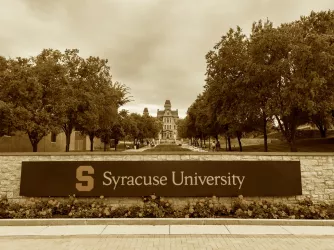Table of Contents
An Anonymous College Administrator Struggles with the OCR Letter
As Torch readers well know, FIRE has been leading the outcry against the new mandates for injustice included in the April 4, 2011, "Dear Colleague" letter from the Department of Education's Office for Civil Rights (OCR).
As it turns out, we (and all of the students and faculty who suddenly find themselves stripped of some very basic rights) are not the only ones struggling with OCR's mandates—at least some college administrators are as well. Inside Higher Ed published a letter from one such administrator who, of course, requested anonymity, but says he or she works at a "selective institution."
Let me comment on several passages from the very revealing letter, which is worth reading in full:
A few years ago, the Center for Public Integrity published a report that excoriated that excoriated [sic] colleges and universities for their handling of sexual assault cases. It was an absolutely indicting report... unless the reader was, like I am, a student affairs professional who could easily imagine being the one publicly criticized in the report. Yes, I could imagine it. Not that I believed at that point (or since) that I had mismanaged a sexual assault case, but because the ones I had managed were enormously complex, full of truths, lies, reversals, angry parents, hungry lawyers and empowered supporters.
In each of these, I did my best to navigate the extremely difficult landscape, managing to avoid a public airing of the case by an ill-informed media or a lawsuit brought by a student (victim or accused) who felt wronged in the process. This is not at all to say I'm incredibly skilled. Luck probably plays more a part in this than most of us feel comfortable admitting publicly. I happen to know some of the professionals the CPI report criticizes, and I doubt I am much more competent than any of them. I have just been fortunate not to have been the one in the proverbial hot seat, directing a process that is complicated and flawed, at the precise moment several factors merged to create a public relations and professional disaster.
To some extent, one can't help but sympathize with this anonymous administrator. Sexual assault cases are very complicated and certainly include "truths, lies, reversals, angry parents, hungry lawyers and empowered supporters." However, we as a society have figured out a way to deal with this, and it doesn't require "luck"; it's called due process, and it requires following the same fair procedures in every case. That's what the criminal justice system is set up to do, and while it's not a perfect system by any means (no system run by humans could be), it makes a concerted effort to honor certain core values: impartiality, legal equality, the presumption of innocence, fundamental fairness, and so forth. It includes protections for the accused, like a significant standard of evidence and a prohibition on "double jeopardy," precisely because those failsafes have been found over hundreds of years to be necessary to prevent outrageous miscarriages of justice.
Due process protections like these and others, such as notice of the charges, an impartial fact-finder, and the right to face one's accuser, are all protections that FIRE has frequently seen denied to students and faculty members accused of campus offenses. These protections are not obstructions to be overcome. Human experience has shown them to be necessary to ensure just outcomes. And outside of academia, they're hardly controversial; in fact, many of them can accurately be described as ancient. One example comes straight from the Bible: Roman Procurator Porcius Festus, discussing the trial of the apostle Paul in Acts 25, tells King Agrippa, "I answered them that it was not the custom of the Romans to give up anyone before the accused met the accusers face to face and had opportunity to make his defense concerning the charge laid against him." And when Paul decides that he cannot receive a fair trial in Jerusalem, he appeals to Caesar. Festus's response: "To Caesar you have appealed; to Caesar you shall go."
That was around the year 60 A.D. In contrast, in the year 2009, East Georgia College professor Thomas Thibeault was fired for a bogus "sexual harassment" charge without notice, a hearing, or any kind of clear charges after he pointed out a flaw in the school's sexual harassment policy. (That miscarriage of justice eventually cost the college $50,000.) And when student Caleb Warner appealed his campus conviction for sexual assault to the University of North Dakota (UND) in the year 2010 on the basis that the real police had charged his accuser with lying to them about the alleged assault, it took nearly a year and a half (not to mention substantial public embarrassment from FIRE and others) for UND simply to allow an appeal.
Rule of thumb: If your judicial procedures can be easily determined to be inferior to those of nineteen-and-a-half centuries prior, you have a serious problem. No person can be expected to administer such a system fairly. Having real and substantial due process is how we remedy such problems.
Speaking of due process, check out why this author chose to be anonymous:
It's not that I believe that we shouldn't be held accountable, and yes, it's likely that these and other institutions should have done things differently. It's just that in my most honest moments, despite the efforts of my (real) colleagues here to craft the best possible approach, I doubt our policies and practices could hold up to the intense scrutiny of the team of lawyers OCR will send after us should a complaint arise. Surely, I reason, you will find something, somewhere, that we could have done better. At that point, all the good we might have also done will be lost in the public critique you will offer and we, because we must, will accept without retort.
That should explain the fact that I am an anonymous author. For six months, my (real) colleagues, here and on other campuses, have been talking about the Dear Colleague Letter, about the problems it creates for us, about the apparent lack of understanding of student culture it demonstrates. But we never say these things too publicly. We worry about being branded "soft" on sexual assault by victims' rights groups and by the media, and we worry about attracting your attention. Our voice has been missing from this debate, just as it seems our input was missing from your letter.
Once again, OCR's lack of consideration for due process rears its ugly head. FIRE's Ari Cohn discussed this very problem—the lack of notice and comment—in a Torch post on September 12 in which he analyzed whether OCR's letter violated the Administrative Procedures Act's notice-and-comment requirements for substantive rulemaking. While these procedures are of course different from those followed by the judiciary in a criminal trial, these provisions represent the proper due process for enacting regulations that have the force of law. It certainly seems obvious that at least some administrators would have appreciated some notice and the opportunity to comment about federal rules that drastically affect their jobs. Unfortunately, since April of this year, due process no longer appears to be something that anyone in higher education—faculty, student, or administrator—can count on.
Recent Articles
FIRE’s award-winning Newsdesk covers the free speech news you need to stay informed.

From the UK to Germany to Singapore: Police are watching what you post

Wisconsin school district mulls unconstitutional ‘hate speech’ policy

A cartoon, a mustache, and a witch hunt: The perils of bias reporting at Syracuse University
